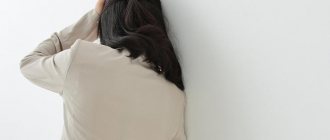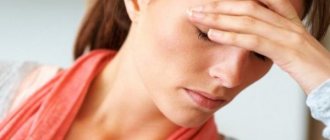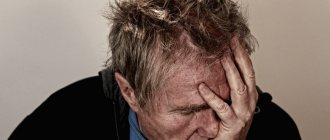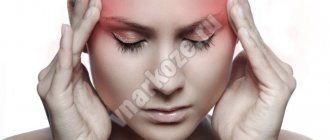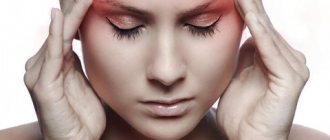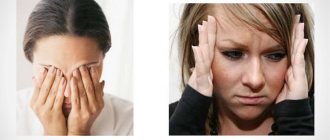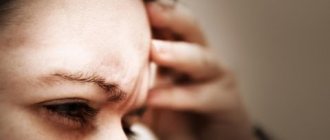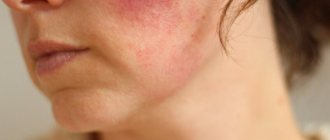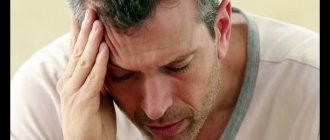Pharmacies sell many medications that will help if you have a headache for several days in a row. But all drugs differ in price and method of use. Many of them simply may not help you. The effect of taking the pill depends on the cause of the pain. It is the factors that contribute to the appearance of headaches that we will consider.
Causes of the problem
There are 5 most famous reasons why you have a headache for several days in a row:
- Overstrain of muscles due to great physical effort or from being in an uncomfortable position.
- Headache may occur due to decreased cerebral vascular function. This can be caused by thick blood, tissue swelling, tumors, or blood clots.
- Impaired blood circulation in the vessels. Most often, this problem occurs when a cyst or other unwanted neoplasm puts pressure on certain areas of the brain. Also, a similar symptom may appear when a bone is displaced, etc.
- Disturbances in the central nervous system (CNS). In this case, pain appears when the nerve fibers are irritated, that is, when they are compressed or pinched.
- The psychological factor manifests itself in the form of mental disorders, which include apathy, depression, stress, and chronic fatigue.
When should you see a doctor?
People who experience pain year after year and every week are familiar with remedies that help individually: a compress on the forehead or a certain drug. But even in such patients, an attack that lasts for several days in a row is always a cause for concern. You should consult a doctor when you have a headache for two days or more, and the symptom has a number of features:
- manifests itself more strongly than usual, intensifies every day;
- cannot be treated with conventional medications;
- worsens with coughing or movement;
- accompanied by fever, neck stiffness, impaired consciousness and memory;
- complicated by neurological symptoms: blurred vision, slurred speech, weakness, numbness or seizures;
- interferes with sleep, worsens in the morning, leads to sudden awakening in the middle of the night;
- associated with soreness and redness of the eye, sensitivity in the temporal region.
Even mild pain that interferes with daily activities and ability to work requires medical intervention. Cranial injuries are always a reason to be examined, since the force of the blow does not always correspond to the damage. Symptoms may appear the next day or a week later, leading to changes in character years later.
The pain sometimes goes away after sleep, rest in the dark and silence, and a cold compress on the frontal part of the head. With a hangover, drinking fluids, vitamin B6, and sorbents helps. For migraines, Ibuprofen is used, as well as triptans, which reduce the sensitivity of the trigeminal nerve receptors.
Histamine pain
It occurs most often in men who have reached the age of 35 (and above), with a strong physique and a smoking history of about 15 years. The pain is localized on one side of the head, radiating to the eyeball. Its duration is about 2-3 hours. With this illness, you should not take medications, as this will only worsen the situation. The first symptoms of such ailment include:
- spontaneous drooping of one eyelid;
- nasal congestion;
- tearfulness;
- dull pain in the head.
Occipital pain
If you have a headache in the back of your head for several days, then most likely blood is not getting to the brain. Most often, this symptom occurs due to a problem with the cervical spine. It is complemented by dizziness and a decrease in the sensitivity of the skin. These symptoms get worse over time. Exercise therapy, massage, and physiotherapy will help you cope with them. You should also consult a doctor who will prescribe pills for normal vascular function. If you experience severe pain, you can take one of the following medications:
- "Ibuprofen."
- "Paracetamol".
- "No-shpa."
- "Aspirin".
Other causes of long-term headaches
Among other factors, consider the following.
Pain after dental treatment
It is believed that tooth extraction does not cause headaches. But the procedure is accompanied by stress, a reflex clenching of the jaws. Muscle spasms are caused by prolonged and wide opening of the jaws, overexertion or rupture of part of the fibers. If the jaw and temple continue to hurt, then arthritis of the temporomandibular joint may occur. It is extremely rare that the needle gets into the muscle fibers, causing discomfort in the entire jaw and temporal bone.
If you have a headache for the second day after tooth extraction, it means that the trigeminal nerve has been stretched. It also innervates the masticatory muscles, which will be reflexively tense.
Pain when the weather changes
Vegetovascular dystonia is a diagnosis that does not exist in the international classification of diseases. It means poor adaptation of blood vessels to environmental changes. The reason is a change in atmospheric pressure, which forces the arteries to react: pump blood as it grows, or vice versa - reduce pressure. Dystonia is an imbalance between the sympathetic and parasympathetic nervous systems. Baroreceptors are located in the area of the aortic arch and carotid sinus, and the responses are mediated by the vagus nerve. Violation of its function is associated with headaches when the weather changes. Patients feel how on the eve of rain it begins to put pressure on the eyes, there is noise in the ears and a feeling of compression of the skull.
In teenagers, blood pressure can drop dramatically due to excess tension in the arteries during a period of rapid growth, and this leads to headaches.
Cervical osteochondrosis
Pain associated with dysfunction in the cervical spine is also called migraine. One of them is caused by compression of the occipital nerve by the oblique capitis muscle. Such attacks are usually associated with exposure to drafts and cold weather, when the neck first begins to hurt.
People usually notice a headache for a few days after a pop in the vertebrae. The reason for this is imbalances in the muscles that attach to the first three cervical vertebrae. They spasm when breathing incorrectly, after severe stress and prolonged sitting with raised shoulders. For example, at the computer or while driving. Muscle imbalances need to be treated
Myopia and headache
The optic and oculomotor nerves pass through the lining of the skull before passing to the muscles and other structures of the eye. Overexertion of vision causes a spasm similar to what occurs in the neck or other muscles. Therefore, when working, it is recommended to take pauses and exercises to relax the eyes - look into the distance.
Diagnostics
In order for a doctor to diagnose the cause of head pain, he needs to know all the symptoms. This is why the patient is interviewed. When making a diagnosis, it is important to determine the location of the headache and its nature. For example, painful sensations can be stabbing, cutting, pressing, pulsating. In addition, several species can be observed simultaneously.
The intensity of pain is also important to determine. It can be either weak or medium. There may be severe discomfort that disrupts the patient’s usual rhythm of life.
If symptoms appear that cause severe discomfort, the patient must contact a qualified specialist who will conduct an examination, collect anamnesis, and, if necessary, prescribe diagnostic measures. For example, MRI to study the state of the brain.
An ultrasound echogram may also be prescribed for diagnosis (sensors are attached to the head and neck in order to measure pressure and also determine impulses). The information obtained will allow you to diagnose the patient and prescribe the correct treatment.
Nonsteroidal drugs
The most commonly used non-steroidal drugs for headaches are:
- "Diclofenac" (available in the form of tablets and rectal suppositories, it is permissible to take 1 time per day).
- “Ibuprofen” is called the most powerful drug, but you are allowed to take only 2 tablets during the day (it fights fever and pain very well, it is good for all categories of patients and even small children).
- “Ketoprofen” (its one-time dose can be considered the use of 2 capsules).
- “Aspirin” (has been known for many years, has practically no contraindications for adults).
What pills cause headaches?
Any drugs for the treatment of headaches can cause excessive pain in patients with primary headaches. (In this article, we refer to the primary pain as the pain that a person had before he started abusing painkillers).
These may be the following medications:
- Nonsteroidal anti-inflammatory drugs (NSAIDs). For example, ibuprofen, paracetamol or aspirin.
- Opioid analgesics. Such as codeine or tramadol. In Russia they can only be obtained by prescription.
- Triptans are special anti-migraine medications.
- Ergotamine-containing drugs. They are also used for migraines.
Analgesics
If pain occurs due to problems with blood vessels, it is recommended to give preference to drugs such as analgesics. In most cases, they are prescribed to patients who have arterial hypertension. Thanks to their constituent components, they eliminate headache symptoms in a short period of time. It is recommended to take 1 or 2 tablets several times a day. The maximum effect can be achieved within 20 minutes after administration, but the duration of action does not exceed a couple of hours. This group of drugs usually includes:
- "Baralgin."
- "Analgin" helps block the pain impulse passing through the nerve endings. The drug has a beneficial effect on heat transfer and effectively copes with fever.
- "Ronalgin."
- "Paracetamol". Acts as a pain reliever and also perfectly relieves fever.
This group of drugs is also recommended in cases where, after a blow to the head, there is a headache for several days in the temples or in any other part.
All drugs from the non-steroidal group are allowed to be taken only after meals. The result becomes noticeable in about half an hour, but sometimes this time can last up to several hours. The resulting effect can be maintained for approximately 5 hours.
It is recommended to take any drug only if the exact causes of headaches have already been established. For example, if the unpleasant sensations are of a liquorodynamic nature, then pills are unlikely to help a person, even with potent ingredients. The appearance of such discomfort is always associated with serious disturbances in the functioning of the entire body.
Osteochondrosis of the cervical vertebrae requires complex therapy. In this case, we are talking about taking anti-inflammatory drugs, as well as chondroprotectors. As an additional measure, you can use a topical medication. In addition, the presence of such a pathology requires careful observation in a hospital, and sometimes a surgical operation is required. All this means that under no circumstances should you rely on yourself and prescribe any pills yourself.
While expecting a child, expectant mothers are prohibited from using almost all anti-headache pills. But even in such a situation there is a way out, so doctors choose drugs that will not cause much harm to the baby. Of course, during such a period, it is important for a woman to completely abandon any medications, but in case of urgent need, she is allowed to take a tablet of Paracetamol, No-shpa or Citramon. They have a good effect and do not cause much harm to a woman’s health.
Most often, for headaches, they choose Citramon, which copes well with the pain syndrome. It contains caffeine, cocoa powder and citric acid.
Pentalgin contains a large number of medicinal components, thanks to which the drug is particularly effective. In addition, each tablet contains a certain amount of caffeine.
Solpadeine, which has a large number of positive reviews, is considered no less popular. The tablets contain paracetamol, so they perfectly eliminate migraine symptoms.
Traditional treatment
Sometimes a headache may appear suddenly. This occurs due to many factors: overwork at work, sudden changes in weather, chronic fatigue, etc. But when such ailments appear, it is not necessary to resort to the use of medications, which, in addition to relieving pain, also have possible side effects. It is much easier to turn to folk remedies, they are effective and will not cause harm. Although folk remedies are not able to fully cope with high-intensity pain, they can significantly reduce it, and in some cases, completely eliminate it.
Herbal infusions for headaches
Since ancient times, people have treated headaches using herbal medicine.
- Valerian root infusion. Place one tablespoon of raw material in a glass of hot water and let it brew for a while. Drink 3 times a day before meals.
- St. John's wort decoction. Brew one and a half tablespoons of the herb with 200 ml of boiled water, let it brew for about an hour, take 3 times a day before meals.
- Bay leaf oil. Take two tablespoons of crushed bay leaves and add 1.5-2 tablespoons of vegetable oil, place everything in a closed container and leave for a week. If a headache occurs, rub into temples.
- Infusion of coltsfoot. Grind the leaves of the plant, pour boiling water over one tablespoon of the raw material, leave for half an hour. Next, filter and take up to 6 times a day, 1 hour before meals.
Causes
There can be many reasons for the appearance of a headache - from simple fatigue to problems requiring surgical intervention. Most often, a headache does not go away for the following reasons:
- stress caused by conflicts or anxiety;
- excessive physical activity;
- rheumatism in the neck;
- excessive use of alcohol or tobacco;
- changes in blood pressure;
- allergies or poisoning;
- drug exposure;
- weather dependence.
Coping with most of these factors is not difficult - a person just needs to change his lifestyle a little, react more calmly to difficulties and balance his diet.
However, in some cases this will not be enough and you will need to take specialized medications or the help of a qualified specialist. The latter is especially important, since self-medication can lead to worsening of the condition or loss of valuable time for medical care.
Doctors note that headaches may be one of the symptoms of the following health problems:
- brain tumor;
- bad teeth;
- diseases caused by parasites, etc.
There are also types of headaches that are not associated with other pathologies. These include:
- migraine;
- cluster headache.
As you can see from the list, the diseases are serious. That is why, if you have a severe headache (and especially if you have headaches every day) and pills do not help, diagnosis is necessary as early as possible in order to prevent complications in the future.
Migraine
This disease lasts a long time - from several hours to several days and is often hereditary. Most often women suffer from the disease. The causes of migraines are mainly sleep problems, hormonal changes, unbalanced nutrition and vascular pathologies. With a migraine, the pain usually has a pulsating nature and is focused on one side of the face.
The disease can be recognized by the symptoms that precede it:
- irritability;
- isolation;
- vomiting or nausea;
- aversion to bright light and noise.
In order for the headache to go away, some changes in diet are needed. Thus, experts recommend giving up alcohol, coffee, citrus fruits, smoked products, chocolate, eggs and cottage cheese. It is best to immediately consult a specialist when symptoms appear and undergo a full diagnosis of the body, based on the results of which a further course of treatment will be proposed. If this is not possible, then the following folk remedies can help:
- lemon peel, which is applied to the temporal areas;
- freshly squeezed potato juice;
- tincture based on clover leaves;
- blackcurrant juice, take 3-4 times a day;
- massage of the temporal areas using mint oil.
As a preventive measure, it is recommended to drink a glass of whey or yogurt every day before breakfast.
Cluster pain
The disease resembles the previous one, but differs in a smaller area of the painful area. As a rule, it occurs at one point of the head. Most often found in men with an athletic build. Characteristic features of the patient's appearance are usually: a square face shape, a cleft chin and light eyes. This type of headache does not occur in children.
Tea for headaches
Products containing low concentrations of active ingredients can be used on an ongoing basis. Tea is one of these folk remedies. Before consuming it, you need to make sure how it affects blood pressure levels. Types of drinks that help with headaches:
- Red tea (hibiscus). Its main component is Damask rose, which gently lowers blood pressure and relieves headaches. For prevention purposes, it is recommended to consume this drink in an amount of no more than two cups per day.
- Oregano and peppermint tea. Brew a tablespoon of the mixture in a glass of boiling water, let it brew for half an hour, then strain.
- Melissa or chamomile tea. Brew a store-bought drink according to the instructions included with it.
Preventing the development of headaches
Often, pain in the back of the head indicates the presence of vascular diseases. Symptoms are especially pronounced with hypertension.
At this time, increased blood pressure is observed. This is associated with the following factors:
- Genetics and hereditary predisposition
- Development of atherosclerosis
- Poor nutrition
- Bad habits
- Depression
- Increased body weight
- The appearance of physical inactivity
The nature of pain in such disorders reaches pulsation and bursting. During movements and bending, they increase.
Often accompanied by nausea, malaise and weakness. In acute forms, vomiting is observed.
At the first sign of occipital pain, immediately consult a doctor.
The causes of this condition can be serious diseases that need to be treated immediately.
Only a doctor is able to diagnose and make an accurate diagnosis. Self-medication is unacceptable; it entails unpleasant consequences.
Prevention
The best way to fight the disease is prevention. By applying the following tips from therapists, you will forget about your headaches:
- Try to be active. Walking in the fresh air and moderate strength loads stimulate the blood vessels of the brain and contribute to its proper functioning.
- If you work at a computer for a long time, set aside five minutes an hour to warm up the muscles of your neck and shoulder girdle with simple exercises, and let your eyes rest.
- While doing work, do not forget about rest breaks. Do not allow your body to become overtired; it causes headaches.
- Night sleep should last at least 8 hours. At the same time, observe the ventilation modes and comfortable temperature in the bedroom. Lack of sleep will lead to nervous conditions, and excess will lead to general lethargy and rapid fatigue.
- Use a comfortable bed and pillow to sleep. It is desirable that both are of orthopedic form.
- Try to avoid stressful situations, spend more time resting and relaxing.
- Eliminate harmful foods from your diet as much as possible. Their components (preservatives, flavor enhancers) contribute to improper functioning of the stomach, which can also result in headaches.
- Limit the use of analgesics and painkillers: no more than 10-15 tablets per month. An overdose is harmful to the body as a whole.
- Drink alcoholic beverages and coffee within reasonable limits. Caffeine and alcohol in large doses constrict blood vessels, which generally has a bad effect on the body. If you have a headache for several days after drinking alcohol, then it should be completely avoided in the future.
Treatment of cephalalgia
If the pills do not help, the patient should be prescribed adequate treatment, and it does not matter whether the headache has been a week or just the second day. This may include various procedures and prescription of medications.
Non-drug treatments include:
- antidepressants: amitriptyline, paroxetine, melipramine;
- muscle relaxants: tolperisone, mefedol, tizanidite;
- non-steroidal anti-inflammatory drugs: ibuprofen, ketoprofen, naproxen.
When you have a headache for a week and there is no way to see a doctor, you can alleviate the condition with simple procedures. Relieves discomfort for a certain time:
- Hot foot bath.
- Cold and hot shower.
- Self-massage of the neck and head.
- Acupressure.
- Using cold or warm compresses.
- Lotions with natural ingredients: grated potatoes, pumpkin pulp, cabbage leaves, burdock.
- Aromatherapy (you can use tea tree oil, lemon, valerian, laurel, mint, lavender for inhalation).
- Decoctions with medicinal herbs: oregano, fireweed, chamomile, peppermint.
Proper prevention and regular examinations, self-monitoring and proper nutrition will help cope with a number of diseases without medications and will not allow you to feel pain for three days in a row or more:
- You need to start the day by charging your body to wake up the circulatory system and speed up your metabolism.
- You need to wake up at a certain time during the week.
- In the evening, a walk in the fresh air will calm the nervous system.
Regardless of whether the headache continues for the third or fourth day, you should not tolerate it. Often it is a sign that indicates problems in the body, especially in the brain.
The effectiveness of the prescribed treatment depends on timely and high-quality diagnosis. The following methods are used in combination:
- manual therapy;
- physiotherapeutic procedures;
- compresses;
- medicines;
- therapeutic exercises;
- massage;
- acupuncture, etc.
Treatment should be prescribed by a specialist, after a thorough diagnosis and identification of the cause of the disease.
With this disease, you should contact a neurologist, who will determine how harmless cephalgia is for the patient’s general condition and methods of therapeutic influence on it.
